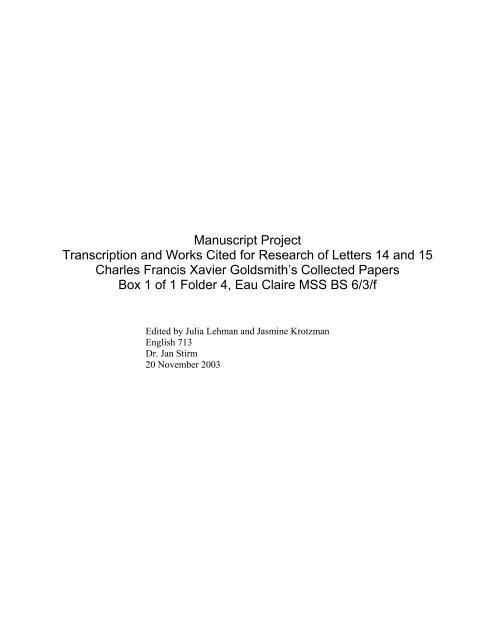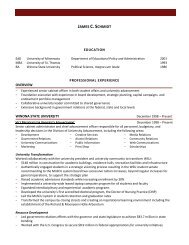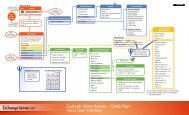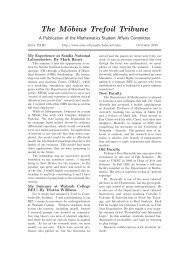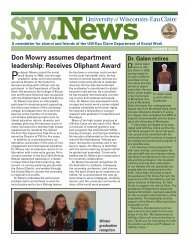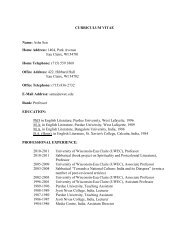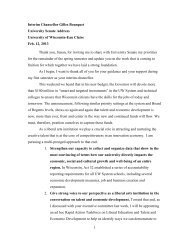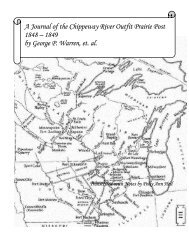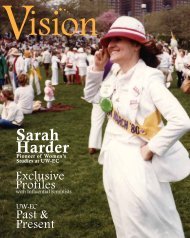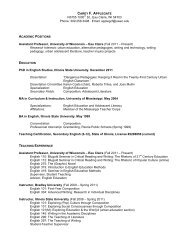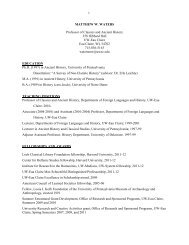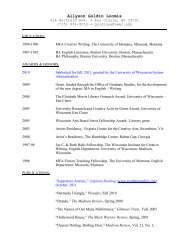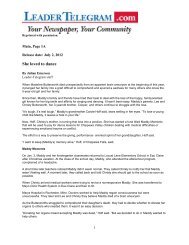Manuscript Project Transcription and Works Cited for Research of ...
Manuscript Project Transcription and Works Cited for Research of ...
Manuscript Project Transcription and Works Cited for Research of ...
You also want an ePaper? Increase the reach of your titles
YUMPU automatically turns print PDFs into web optimized ePapers that Google loves.
<strong>Manuscript</strong> <strong>Project</strong><br />
<strong>Transcription</strong> <strong>and</strong> <strong>Works</strong> <strong>Cited</strong> <strong>for</strong> <strong>Research</strong> <strong>of</strong> Letters 14 <strong>and</strong> 15<br />
Charles Francis Xavier Goldsmith’s Collected Papers<br />
Box 1 <strong>of</strong> 1 Folder 4, Eau Claire MSS BS 6/3/f<br />
Edited by Julia Lehman <strong>and</strong> Jasmine Krotzman<br />
English 713<br />
Dr. Jan Stirm<br />
20 November 2003
Introduction<br />
This edition contains transcriptions <strong>of</strong> two letters from the papers <strong>of</strong> Charles Francis<br />
Xavier Goldsmith, a collection <strong>of</strong> papers from 1821-1923 collected by Father Goldsmith, an<br />
early settler <strong>of</strong> Chippewa Falls. The collection includes correspondence between the Cadotte <strong>and</strong><br />
Ermatinger families, letters involving Indian Agents George <strong>and</strong> William Warren, <strong>and</strong> legal<br />
documents concerning the Chippewa Indians.<br />
The first letter in this edition is from Henry Blatch<strong>for</strong>d to Edward Warren, <strong>and</strong> the second<br />
letter is from William Whipple Warren to George P. Warren. Biographical in<strong>for</strong>mation about<br />
each <strong>of</strong> these individuals is in the following sections <strong>of</strong> this introduction. The original,<br />
h<strong>and</strong>written letters are located in the Special Collections at the UW-Eau Claire McIntyre Library,<br />
letters 14 <strong>and</strong> 15 from the Charles Francis Xavier Goldsmith collection, Box 1 <strong>of</strong> 1.<br />
We started with an interest in Native American affairs <strong>and</strong> the early fur traders; this led to<br />
an increasing interest in the letters involving William Whipple Warren—the letter we chose<br />
exemplifies his commitment to the Natives. This interest was further developed in the letter from<br />
Henry Blatch<strong>for</strong>d because it provides a different perspective—that <strong>of</strong> a Presbyterian minister—<br />
on Native American affairs <strong>and</strong> the ethics <strong>of</strong> the fur trade. In reading this collection, we noticed<br />
continuities between this series <strong>of</strong> letters. To most effectively represent this ongoing<br />
conversation, we decided to combine these specific letters into one edition in order to give a<br />
clearer underst<strong>and</strong>ing <strong>of</strong> the context <strong>and</strong> content. To provide a background <strong>and</strong> context <strong>for</strong> these<br />
letters, many <strong>of</strong> these items are addressed in the following sections <strong>of</strong> this introduction.<br />
In creating this edition, we encountered several challenges. Occasionally, some words are<br />
illegible <strong>and</strong> identities <strong>of</strong> some people are unknown. This especially applies to the second letter,<br />
which contains over fifteen different names <strong>of</strong> people <strong>and</strong> places. It is difficult to find<br />
in<strong>for</strong>mation on people when only the last name is provided, letters <strong>of</strong> the name are illegible, or
no location or relationship is given in context with the name. In these cases, we investigated<br />
numerous city records, including census in<strong>for</strong>mation from 1849-1850, state historical<br />
publications, <strong>and</strong> other letters in the collection in an attempt to make possible identifications.<br />
Sometimes identification was not possible; in these cases we made our best conclusions based on<br />
the in<strong>for</strong>mation we had.<br />
Who Was Henry Blatch<strong>for</strong>d?<br />
The author <strong>of</strong> the first letter in this edition, Rev. Henry Blatch<strong>for</strong>d, is listed in his<br />
February 16, 1901 obituary in the Ashl<strong>and</strong> Daily Press as a “Famous Missionary.” Henry was<br />
born Francois Descarreaux (likely originally spelled “des Carreaux”), the youngest <strong>of</strong> four<br />
children, around 1810 at S<strong>and</strong>y Lake, Minn. Henry’s father was Francois Descarreaux—a french<br />
soldier in the campaigns <strong>of</strong> Napoleon who came to America <strong>and</strong> settled at S<strong>and</strong>y Lake as a fur<br />
trader. Henry’s mother was Waubojeeg, a Native American woman thought to be a daughter <strong>of</strong><br />
Chief Waub-Ojeeg/“White-Fisher” <strong>and</strong> Misquobonoquay <strong>of</strong> La Pointe, Wisconsin. Henry’s<br />
mother did not survive long after his birth, <strong>and</strong> his father died when he was eight years old. In<br />
1823, when Henry was 13, he was placed in the Mackinaw Mission school, where he was named<br />
Henry Blatch<strong>for</strong>d after Rev. Henry Blatch<strong>for</strong>d, the pastor <strong>of</strong> a church in Michigan <strong>and</strong> his father<br />
the well-known oil manufacturer, E W. Blatch<strong>for</strong>d, <strong>of</strong> Chicago; sources indicate that children<br />
who attended school at the Mackinaw Mission were named after mission supporters. Henry<br />
remained a student <strong>and</strong> apprentice at the Mackinaw Mission school until 1831.<br />
In the summer <strong>of</strong> 1834, Henry came to La Pointe <strong>and</strong> became employed as an interpreter<br />
<strong>and</strong> missionary at the Pokegama Mission in Minnesota. According to the 1839 record <strong>of</strong> mixed<br />
blood Census <strong>of</strong> Chippewa <strong>of</strong> Lake Superior, Henry is listed as Francois Decharrault, with wife<br />
Frances Decharrault <strong>and</strong> daughter Susan—around 1837, Henry had returned to La Pointe, where<br />
he married Francis Conner, born around 1816 in La Pointe, the daughter <strong>of</strong> Thomas Conner, a
fur trader, <strong>and</strong> Susan Duchene. For many years, Henry worked as an interpreter <strong>and</strong> missionary<br />
between La Pointe <strong>and</strong> Odanah—on the 1850 Census <strong>of</strong> La Pointe, he is listed as Francois<br />
Decarreau, age 36, Interpreter; on the 1860 Census <strong>of</strong> Odanah, he is listed as Henry Blatch<strong>for</strong>d,<br />
Interpreter, Mission. When the mission at Odanah came under the control <strong>of</strong> the Presbyterian<br />
Church, Henry eventually became the sole pastor <strong>of</strong> the Presbyterian mission. Throughout the<br />
years, Henry translated a series <strong>of</strong> school textbooks, scriptures, <strong>and</strong> other books into Ojibwa. We<br />
also know that Henry worked as an interpreter on the Indian treaties, as he is listed as an<br />
Interpreter on the Treaty with the Chippewa <strong>for</strong> the Mississippi <strong>and</strong> Lake Superior (1847) <strong>and</strong> on<br />
the Treaty with the Chippewa (1854).<br />
This in<strong>for</strong>mation about Francois Descarreaux/Henry Blatch<strong>for</strong>d came from census<br />
records from La Pointe <strong>and</strong> Odanah from 1839-1870, online Descarreaux family genealogy<br />
in<strong>for</strong>mation, <strong>and</strong> Descarreaux family researcher Jean Loehde, who provided the 1901 obituary <strong>of</strong><br />
Henry Blatch<strong>for</strong>d. Nothing is known <strong>for</strong> sure about Henry’s connection with Edward Warren, to<br />
whom he wrote the first letter in this edition, or with Edward’s twin brother George or their<br />
cousins William <strong>and</strong> Truman Warren, whom Henry was also acquainted with. However, several<br />
possibilities exist based on the in<strong>for</strong>mation we have. George <strong>and</strong> Edward grew up in La Pointe<br />
where Henry Blatch<strong>for</strong>d also lived, <strong>and</strong> when their father Truman died, their Uncle Lyman<br />
Warren raised them together with their cousins, including William <strong>and</strong> Truman Warren. In<br />
addition, sources indicate that as a child William Warren attended the mission school at La<br />
Pointe <strong>and</strong> later at Mackinaw, revealing that Henry Blatch<strong>for</strong>d could have met William <strong>and</strong><br />
possibly the other Warren boys at the Mackinaw Mission school. Furthermore, Henry <strong>and</strong><br />
William Warren were both working as interpreters, as they are both listed on at least the 1842,<br />
1847, <strong>and</strong> 1864 treaties with the Chippewa. There are many possible explanations <strong>for</strong> their<br />
acquaintance, <strong>and</strong> the tone <strong>of</strong> the letter clearly indicates that Henry most likely knew the Warren
oys since they were children. Since Henry was about 15 years older than all the Warren boys,<br />
just as he states in his letter, he felt like a father to them.<br />
The Context: Edward Warren, Henry Blatch<strong>for</strong>d, <strong>and</strong> Selling Liquor to<br />
the Natives<br />
This letter is unique <strong>for</strong> two reasons: it is one <strong>of</strong> only two letters in the collection to<br />
Edward Warren, since he died in a hunting accident in July <strong>of</strong> 1849 (about six months after he<br />
received Henry Blatch<strong>for</strong>d’s letter), <strong>and</strong> it is the only letter from Henry Blatch<strong>for</strong>d. Furthermore,<br />
because Henry was a missionary working among the Ojibwe Indians, <strong>and</strong> Edward <strong>and</strong> George<br />
Warren were fur traders, this letter also represents a tension <strong>of</strong> the time: the ethics <strong>of</strong> selling<br />
liquor to the Indians. To provide the context out <strong>of</strong> which Henry Blatch<strong>for</strong>d writes to Edward<br />
Warren, the following paragraphs give the background <strong>and</strong> context on trading liquor with the<br />
Indians.<br />
According to Meyer Weinberg in Chapter 2 <strong>of</strong> A Short History <strong>of</strong> American Capitalism,<br />
European settlers in America encountered several setbacks with Native Americans, namely that<br />
Native Americans refused to further themselves at the expense <strong>of</strong> others, <strong>and</strong> they insisted on<br />
only trapping as many animals as they needed instead <strong>of</strong> building up huge reserves <strong>for</strong> future<br />
trading. Furthermore, Native Americans were willing to trade expensive furs <strong>for</strong> goods that were<br />
cheap in European markets, so European settlers took advantage <strong>of</strong> this <strong>and</strong> solved the problems<br />
they had encountered using one simple device: whiskey.<br />
By quoting several anthropologists <strong>and</strong> historians, Weinberg describes how British,<br />
French, <strong>and</strong> American traders used whiskey as a “disorienting factor” with Native Americans.<br />
According to one anthropologist, Indians “saw their l<strong>and</strong> taken without proper compensation <strong>and</strong><br />
their people captured <strong>for</strong> slaves, cheated by traders, <strong>and</strong> plied with liquor.” Historians have<br />
remarked that “furs, women, <strong>and</strong> liquor were common ingredients <strong>of</strong> the French frontier in North<br />
America” <strong>and</strong> that “Liquor was the most powerful weapon which the traders could employ in
their struggles with one another.” Weinberg presents Rhoda Gilman, describing Indian life on the<br />
upper Mississippi, who writes: “One widespread characteristic <strong>of</strong> Indian culture which persisted<br />
despite the new variety <strong>of</strong> goods available was indifference to acquiring wealth beyond the<br />
immediate need…It was a major factor leading…[the trader] to introduce liquor.” According to<br />
Thomas Norton, “so many people violated the liquor laws that the authorities had little chance <strong>of</strong><br />
effectively h<strong>and</strong>ling the situation.” As a result, as early as the 1770s, alcoholism was growing<br />
among the Indians.<br />
This in<strong>for</strong>mation demonstrates that the sale <strong>of</strong> liquor to Native Americans was seen as a<br />
manipulative strategy by traders, <strong>and</strong> was extremely destructive to the Native Americans. It is<br />
easy to see then, by 1849 when Henry Blatch<strong>for</strong>d wrote his letter to Edward Warren, the problem<br />
<strong>of</strong> alcoholism among the Native Americans <strong>and</strong> knowledge <strong>of</strong> the use <strong>of</strong> alcohol to take<br />
advantage <strong>of</strong> them, is seen by Henry, being a missionary among the Ojibwe, as a negative,<br />
destructive, <strong>and</strong> immoral influence.<br />
Who Was William Whipple Warren?<br />
William Whipple Warren was born in La Pointe, Wisconsin on May 27, 1825. His<br />
parents were Lyman Warren II <strong>and</strong> Mary Cadotte. Lyman Warren II descended from a<br />
Mayflower Pilgrim, Richard Warren, <strong>and</strong> Mary Cadotte was an Ojibwe. William was taught the<br />
Ojibwe language at a very young age. As a young boy, William served as an <strong>of</strong>ficial<br />
government interpreter <strong>for</strong> the government’s relations with the Indians. During the summer <strong>of</strong><br />
1836, the young boy went with his gr<strong>and</strong>father, Lyman Warren, to Clarkson, New York. He<br />
stayed <strong>and</strong> attended school there <strong>for</strong> two years. After that, he moved near Utica <strong>and</strong> studied at<br />
the Oneida Institute at Whitesborough until 1841. William was well educated, bilingual, <strong>and</strong> an<br />
avid reader <strong>and</strong> became a successful <strong>and</strong> highly respected <strong>and</strong> dem<strong>and</strong>ed interpreter <strong>for</strong> treaties<br />
<strong>and</strong> other important meetings. On August 10, 1843, eighteen-year-old William married Matilda
Aitken, daughter <strong>of</strong> William Aitken <strong>and</strong> Gin-Gion-Cumig-Oke. They had five children: Alfred<br />
A., Cordelia (Delia) H., Ann, William Tyler, <strong>and</strong> Madeline. The Warren’s family moved to<br />
Crow Wing, Minnesota the fall <strong>of</strong> 1845, <strong>and</strong> William worked as a farmer <strong>and</strong> an interpreter<br />
there. The family later made their home at Two Rivers, Minnesota (now Morrison County).<br />
William was a member <strong>of</strong> the Legislature in 1850 <strong>and</strong> the House <strong>of</strong> Representatives in 1851. He<br />
spent much <strong>of</strong> his life documenting the oral histories <strong>of</strong> the Ojibwe people. He wrote the History<br />
<strong>of</strong> the Ojibway People in 1852 <strong>and</strong> it was first published in 1885. The book is the result <strong>of</strong> his<br />
life’s ef<strong>for</strong>t to interpret <strong>and</strong> underst<strong>and</strong> the natives. He spent years suffering lung troubles <strong>and</strong><br />
died from tuberculosis on June 1, 1853 at age twenty-eight.<br />
Almost every account <strong>of</strong> William Whipple Warren mentions his great honesty, integrity,<br />
<strong>and</strong> devotion. An excerpt from his eulogy reads, “From his kindly <strong>and</strong> generous nature, he has<br />
been a favorite, especially with chiefs <strong>and</strong> old men.” He strived to underst<strong>and</strong> <strong>and</strong> maintain the<br />
rights <strong>of</strong> his relatives, the Ojibway people.<br />
Context: Native-Government Relations<br />
Much <strong>of</strong> William Whipple Warren’s life <strong>and</strong> employment centered around the Natives.<br />
Being half Indian himself, Warren was very much concerned with the Chippewa <strong>and</strong> Ojibway<br />
people <strong>and</strong> their relationship with the government. This is illustrated in the stance he took<br />
regarding the Treaty with the Chippewa, 1842. The Chippewa Indians received a Removal<br />
Order from President Taylor in 1849. In a statement to the Territorial Legislature, Governor<br />
Ramsey explained this order, “the Chippewa needed to be removed because the white settlers in<br />
the Sauk Rapids <strong>and</strong> Swan River area were complaining about the privileges given to the<br />
Chippewa Indians.” The Indians believed that they were not to be denied the possession <strong>of</strong> their<br />
l<strong>and</strong>s so long as they behaved themselves. The Chippewas had always been good Indians, <strong>and</strong><br />
with this underst<strong>and</strong>ing they signed the treaty at La Pointe in 1842 that ceded to the government
all their territory east <strong>of</strong> the Mississippi, including the St. Croix area <strong>and</strong> east to the Chippewa<br />
River. More than likely, the Indians never knew that they had ceded their l<strong>and</strong>s until the<br />
Removal Order came in 1849. Warren expressed much concern over this matter in a nine-page<br />
letter he had written (prefaced with an introduction from Governor Ramsey) to L. Lea,<br />
Commissioner <strong>of</strong> Indian Affairs in Washington, D.C. He expressed his determination <strong>and</strong><br />
commitment to the cause: “Not only in their councils, but throughout the whole length <strong>of</strong> my<br />
journey, I heard in every lodge <strong>and</strong> from the mouth <strong>of</strong> every man <strong>and</strong> woman a determination<br />
expressed not to remove.”<br />
William Whipple Warren spent his short life educating himself <strong>and</strong> others about the<br />
Ojibway people <strong>and</strong> culture. He fought <strong>for</strong> their rights <strong>and</strong> assisted in bridging the language <strong>and</strong><br />
cultural gap between the whites <strong>and</strong> the Natives. Even in rapidly declining health, he devoted a<br />
great deal <strong>of</strong> energy to his work. The following letter from William Whipple Warren to his<br />
cousin indicates his strong ties with the Indians <strong>and</strong> his decline in health.
Editors’ Notes<br />
In an attempt to preserve the authenticity <strong>and</strong> minimize disruptions to the original letter, we used<br />
the following conventions.<br />
• Any variation between the original <strong>and</strong> this edition <strong>of</strong> the text (e.g., inserted words) is<br />
indicated in footnotes.<br />
• We transcribed the letters word-<strong>for</strong>-word, including line breaks. It was not possible to<br />
maintain the original pagination, but we indicated page breaks in editors’ parentheses.<br />
• We maintained original punctuation <strong>and</strong> capitalization.<br />
• We preserved original spellings but footnoted them with modern spellings.<br />
• Crossed out words in the original letter are indicated by “---” <strong>and</strong> footnoted <strong>for</strong> further<br />
explanation.<br />
• Illegible letters are indicated with “-” <strong>and</strong> footnoted <strong>for</strong> further explanation.<br />
• People <strong>and</strong> places are only footnoted once unless additional in<strong>for</strong>mation was required in a<br />
specific instance.
LaPointe 1 Dec 29 th, 1848<br />
Dear Sir 2 : 3<br />
Allow me to in<strong>for</strong>m you that we are<br />
all getting pretty smart <strong>and</strong> hoping that you<br />
are the same. I have nothing at all that I<br />
can write about we have had no news at<br />
all from any quarter 4 , only would I relate<br />
to you that I heard from W m Warren 5 not<br />
long ago, he says that he is very smart <strong>and</strong><br />
getting better all the time, <strong>and</strong> also he has<br />
received a little money from the Indians at<br />
Crow Wing 6 , $500.00 from them <strong>and</strong> much<br />
more from the Traders but he did not state<br />
in his letter how much he got in all, but I<br />
know this that whenever he writes, the theme<br />
<strong>of</strong> his Letter is telling about he being so well<br />
<strong>of</strong>f, he says that he is kind to the Ind Agt 7<br />
<strong>and</strong> also to Mr. Rice 8 <strong>and</strong> gets $300.00 a year<br />
1<br />
La Pointe, Wisconsin; One <strong>of</strong> the main trading posts <strong>for</strong> the area located in Ashl<strong>and</strong> County, Wisconsin, on<br />
Madeline Isl<strong>and</strong>.<br />
2<br />
Sir is Edward Warren (1823-1849), see Appendix C: Family Tree. Edward is twin brother to George Warren <strong>and</strong><br />
friend to the author <strong>of</strong> this letter, Reverend Henry Blatch<strong>for</strong>d. According to a July 1849 entry in the Chippeway<br />
River trading post journal, Edward was fatally shot in a hunting accident in July <strong>of</strong> 1849, about six months after he<br />
received this letter. For more in<strong>for</strong>mation about Henry Blatch<strong>for</strong>d, see “Who was Henry Blatch<strong>for</strong>d?” in the<br />
introduction.<br />
3<br />
Replaced use <strong>of</strong> an unreproducible symbol in the original letter with colon; the symbol in original is common to<br />
h<strong>and</strong>written legal documents <strong>of</strong> the time <strong>and</strong> is most likely equivalent to a colon.<br />
4<br />
Quarter; proper station, specific place, or an assigned residency. Around the time this letter is written, Edward is<br />
working with his brother, George, at their trading post in Chippewa Mills, near Chippewa City.<br />
5 m<br />
W Warren; William Whipple Warren (1825-1853), see Appendix C: Family Tree. William is cousin to George<br />
<strong>and</strong> Edward. See “Who Was William Whipple Warren?”<br />
6<br />
Crow Wing, Minnesota; named after the Crow Wing River; loose translation <strong>of</strong> “Kagiwigwan”, the Ojibway name<br />
<strong>for</strong> river.<br />
7<br />
Ind Agt; abbreviation <strong>for</strong> Indian Agent.
from each, Tom Ti- 9 is well to 10 smart to [go]<br />
running to the Indians all the time, I hope<br />
that you are doing well in Trading with the In-<br />
dians, I hope too that you are not carrying that<br />
Poisonous stuff to the poor Ignorant Indians 11 .<br />
I think that a man who gives Liquor to the<br />
Indians is under a great crime in the sight<br />
<strong>of</strong> the great searcher <strong>of</strong> all hearts 12 , you <strong>and</strong><br />
I see very plain be<strong>for</strong>e our own eyes, that these<br />
(page break)<br />
Indians are perishing fast enough without aggravating<br />
their Perishing condition, My Dear friend in order to<br />
see this thing plainly just <strong>for</strong> instance, place your-<br />
self in their stead, I think he who deals out Liquor<br />
to the Indians might just as well take a Knife<br />
<strong>and</strong> cut their throats whenever he goes into a Lodge<br />
<strong>and</strong> then take his furs. Now my friend you need<br />
not argue upon this subject, because you Know<br />
too well <strong>for</strong> it, Conscience tells you that it is<br />
so, <strong>and</strong> every honest reasoning tell’s 13 it is so, Now<br />
I dont 14 write thus becaus 15 I think that you are<br />
8 Mr. Rice; Henry Mower Rice (1816-1894), Minnesota Senator (1858-1863) <strong>and</strong> c<strong>and</strong>idate <strong>for</strong> Governor in 1865.<br />
William was working as an interpreter <strong>for</strong> Henry Rice.<br />
9 The third letter is illegible, but it may be a “b”; Tom Ti- may have worked with George <strong>and</strong> Edward <strong>and</strong> could<br />
possibly have been an Indian Agent.<br />
10 To; incorrect use <strong>of</strong> “to,” most likely meant “too.”<br />
11 See Appendices A & B; throughout the Chippeway River trading post journal, Edward <strong>and</strong> George Warren are<br />
clearly selling liquor to the Indians.<br />
12 Great searcher <strong>of</strong> all hearts; most likely referring to God, since Henry Blatch<strong>for</strong>d, the author <strong>of</strong> this letter, is a<br />
minister.<br />
13 Tell’s; missuse <strong>of</strong> apostrophe in original, should be “tells.”
dealing in that kind <strong>of</strong> article, no but because I<br />
want you to beware <strong>of</strong> it, you might probbably think<br />
Like the other folks, that you cannot make your<br />
Living unless you deal in that kind 16 <strong>of</strong> stuff a little, you<br />
know most traders are apt to think if they dont<br />
make out very well with their goods, then they must<br />
have some Liquor, Now my friend 17 Edward 18 be an honest Man,<br />
<strong>and</strong> a good Man, try <strong>and</strong> earn your <strong>for</strong>tune in an<br />
Honest way, <strong>and</strong> dont kill your fellow man by dealing<br />
Poison to him, be a temperate man in all things.<br />
You may Probbably 19<br />
think it strange that I should write thus, but I<br />
want to do my duty towards a brother <strong>of</strong> mine I am<br />
so much attached to you young Boys 20 . I feel --- 21<br />
towards you as if I were a brother to you, <strong>and</strong><br />
you may 22 perhaps find me a Little too plain sometimes<br />
(page break)<br />
but you must bear with me a little, now my friend<br />
if you have a chance please send Francis 23 some ui-<br />
ni-si-kens 24 , <strong>for</strong> her toothach 25 , <strong>and</strong> also one bear<br />
14<br />
Dont; ommission <strong>of</strong> apostrophe inconsistently throughout the original letter, author likely meant “don’t.”<br />
15<br />
becaus; most likely a misspelling <strong>for</strong> “because”<br />
16<br />
“kind” is an insertion above the line<br />
17<br />
“friend” is an insertion above the line<br />
18<br />
Sir; Edward Warren, recipient <strong>of</strong> this letter. See footnote 2.<br />
19<br />
Probbably; consistent misspelling <strong>of</strong> “probably.”<br />
20<br />
Boys; Edward <strong>and</strong> his twin brother George, <strong>and</strong> probably also William Warren <strong>and</strong> their other cousins.<br />
21<br />
Stricken words in original letter. Appears to be ‘as I’ crossed out.<br />
22<br />
“may” is an insertion above the line<br />
23<br />
Francis; Documents <strong>of</strong> the time indicate she was Henry Blatch<strong>for</strong>d’s wife, originally Francis Conner.<br />
24<br />
Ui-ni-si-kens; misspelling <strong>of</strong> the Ojibwe word winisikens, meaning a certain leaf used <strong>for</strong> tea <strong>and</strong>/or medicine.
skin, Since you left we have been expecting some<br />
one from that quarter thinking to receive the bear<br />
skin that you promise so very kindly to us,<br />
Now I want to know how<br />
George 26 is, is he as wild as ever, or is he a better<br />
Boy, since you have him under your eye, I hope<br />
that you will make something this year <strong>for</strong> rainy<br />
days, please write by the first opportunity <strong>and</strong><br />
let me know every thing the shape <strong>of</strong> news.<br />
Trume 27 had a falling out with Nettleton 28 this fall.<br />
Nettleton wanted to Borrow Pom pay 29 <strong>for</strong> 20 Minutes<br />
so Tom Ti- got the Horse ready <strong>for</strong> Nettleton, <strong>and</strong><br />
sure enough the Horse was borrowed, to Replun-<br />
der lock 30 , George turned Traitor, a Bill <strong>of</strong> Sale<br />
they had made as between friends was made use<br />
<strong>and</strong> George took the Horse upon the strength <strong>of</strong><br />
that sale bill, <strong>and</strong> there<strong>for</strong>e Trume send word<br />
that he would charge him $3.00 per day <strong>for</strong> the<br />
use <strong>of</strong> the Horse, <strong>and</strong> also Trume would not settle<br />
unless they brought the Horse down, Well after all they<br />
had to bring the Horse down to Trume <strong>and</strong> come<br />
25<br />
Toothach; misspelling <strong>of</strong> “toothache.”<br />
26<br />
George; George Parsons Warren (1823-1884); twin brother to the recipient <strong>of</strong> this letter, Edward. See Appendix<br />
C: Family Tree.<br />
27<br />
Trume; Truman A. Warren (1827-1888), brother <strong>of</strong> William Warren, both <strong>of</strong> whom were cousins to Edward, the<br />
recipient <strong>of</strong> this letter, <strong>and</strong> his brother George. See Appendix C: Family Tree.<br />
28<br />
Nettleton; unknown person who probably did business with George <strong>and</strong> Truman. This has to do with some sort <strong>of</strong><br />
disagreement between Nettleton, Truman, <strong>and</strong> George about a debt regarding a horse.<br />
29<br />
Pom pay; the name <strong>of</strong> the horse that Nettleton wanted to borrow from Trume.<br />
30<br />
Replunder lock; slang <strong>for</strong> a receiver or a place <strong>for</strong> receipt <strong>of</strong> stolen goods. To steal from the person who stole,<br />
George had to turn traitor <strong>and</strong> go back on his word.
to a settlement, now everything is settled, now let<br />
me close <strong>for</strong> it is getting late at night, Fare ye well <strong>for</strong><br />
a while, Much Love to you Both, Believe me to be your sincere<br />
Friend.<br />
Henry Blatch<strong>for</strong>d 31<br />
31 Henry Blatch<strong>for</strong>d; Reverend Henry Blatch<strong>for</strong>d, friend to Edward <strong>and</strong> George.
32 Rats 32 no. 1 33 Deer Skins 3,00<br />
106 Do 34 no 2<br />
73 Do no 3<br />
1 mink –<br />
1 martin –<br />
1 fisher<br />
2 lynx @ 4t<br />
32<br />
Rats; Records <strong>of</strong> the time indicate this means “muskrat.” This is also in agreement with the Chippeway trading<br />
post journal.<br />
33 th<br />
This list <strong>of</strong> goods corresponds to the January 28 entry in the trading post journal. While his brother George was<br />
away on business, Edward apparently worked at the trading post <strong>and</strong> copied these entries on the back <strong>of</strong> this letter,<br />
later copying them into the actual journal, probably when his brother returned. See Appendix A: pg. 24 <strong>for</strong> a copy <strong>of</strong><br />
the January 28 th entry from the journal. Since this is about a month after Blatch<strong>for</strong>d dated the letter, it is plausible<br />
that O-Sho-ga, listed in the 28 th entry, could have given this letter to Edward on the 28 th when he arrived at the<br />
trading post to do business.<br />
34<br />
Do; Records <strong>of</strong> the time indicate this means “ditto.” This is also in agreement with the Chippeway trading post<br />
journal.<br />
*Chippewa Mills; This location was about 40 miles north <strong>of</strong> the lower rapids <strong>of</strong> the Chippewa River, where a mill<br />
was owned by H.S. Allen. George <strong>and</strong> Edward’s trading post was a few miles from the mill, but in sight <strong>of</strong> the<br />
buildings on the river at Chippewa City.<br />
** Omission—appears to be ‘half’ crossed out. This entry corresponds to the January 30 th entry in the Chippeway<br />
trading post journal. See Appendix B: pg. 25 <strong>for</strong> a copy <strong>of</strong> the January 30 th entry. “Unsmoked” indicates pounds <strong>of</strong><br />
unsmoked deer skin; “smoked” indicates pounds <strong>of</strong> smoked deer skin. “Pccu skin” indicates pounds <strong>of</strong> shaved deer<br />
skin; “fer y” indicates red fox.<br />
*** The direction <strong>of</strong> this calculation indicates it represents the value given <strong>for</strong> the January 30 th entry.<br />
**** The direction <strong>of</strong> this calculation indicates it represents the value given to O-Sho-ga <strong>for</strong> his goods on January<br />
28 th , probably $13.85 or $16.05.<br />
***** The direction <strong>of</strong> this calculation indicates it represents the value given on January 30 th , probably $5.40.
Crow Wing 35 March 1 st 1849<br />
Dear Cousin 36 ,<br />
I must own that I have<br />
been rather negligent in my correspondence with<br />
you this winter. I have not had any good<br />
news to relate is one reason I have not written<br />
be<strong>for</strong>e. My health 37 has been poor all winter <strong>and</strong><br />
<strong>of</strong> late I have been confined to the house.<br />
I don’t want to believe that I have the consump-<br />
tion, but I think I am hard on to it, <strong>and</strong> I<br />
have no doubt but my days are numbered.<br />
Through my ill health last fall I was not able<br />
to do as well as I expected at the payment.<br />
The Indians 38 paid me about $400.00. The traders<br />
with the exception <strong>of</strong> Aitkens 39 paid me none as<br />
they did not get paid to the full amt 40 <strong>of</strong> their<br />
claims. So far as living is concerned I have<br />
got along quite well this winter. It cost me<br />
something to commence house keeping, <strong>and</strong> prov-<br />
isions have been dear, but I have tried well<br />
35<br />
William Whipple Warren moved to Crow Wing, Minnesota in the fall <strong>of</strong> 1845. Lumbering <strong>and</strong> fur trading were<br />
the two main industries in Crow Wing.<br />
36<br />
Cousin; Most likely George P. Warren (1823-1884). See Appendix C: Family Tree.<br />
37<br />
health; William Whipple Warren suffered from lung problems <strong>for</strong> many years <strong>and</strong> died from tuberculosis June 1,<br />
1853.<br />
38<br />
Indians; this refers to the Ojibway Indians. They are sometimes also called the Chippeway Indians.<br />
39<br />
Aitkens; William A. Aitkens (1785-1851) was William’s father-in-law. He was the Department’s chief trader <strong>for</strong><br />
the American Fur Company. Aitkens was eventually fired <strong>for</strong> not turning over funds received from an Ojibwe<br />
Treaty.<br />
40<br />
amt; abbreviation <strong>for</strong> amount
this winter <strong>and</strong> within means.<br />
My wife 41 <strong>and</strong> children 42 <strong>and</strong> the girls have enjoyed<br />
good health, but have been lonesome this winter.<br />
I have heard from Truman 43 two or three times. He<br />
had some trouble with Nettleton about a<br />
debt 44 <strong>and</strong> has given his wacth 45 as security<br />
(page break)<br />
<strong>for</strong> $80.00 which I have concluded to<br />
send him by first chance.<br />
To tell the truth I don’t like this country as<br />
well as I do Chippeway 46 <strong>and</strong> Lapointe. The<br />
Indians are better <strong>and</strong> probably the reason is<br />
that my health is so bad <strong>and</strong> no relation near<br />
by. I am satisfied that were my health good<br />
I could make money but under present state<br />
<strong>of</strong> health it is a charity in Mr. Rice 47 to keep<br />
me in his employ 48 .<br />
About the lumber business, the Indians here<br />
have placed it pretty much in my h<strong>and</strong>s.<br />
Last fall a man <strong>of</strong> the name <strong>of</strong> Brown 49 went up<br />
41<br />
wife; Mathilda Aitken (1822-1902) married Willaim Whipple Warren on August, 10 1843. See Appendix C:<br />
Family Tree.<br />
42<br />
children; Alfred A. (1844-1934), Cordelia H. (1846-1940), Anna (1846-1940), <strong>and</strong> William Tyler (1848-1900);<br />
Madeline (1853-1907) was not yet born.<br />
43<br />
Truman; Truman A. Warren (1827-1888) was William Whipple Warren’s brother. See Appendix C: Family Tree.<br />
44<br />
debt; regarding a horse named Pom Pay<br />
45<br />
wacth; probably a misspelling <strong>for</strong> watch<br />
46<br />
Chippeway; earlier spelling <strong>for</strong> Chippewa.<br />
47<br />
Mr. Rice; probably referring to Henry Mower Rice. See footnote 8.<br />
48<br />
employ; William <strong>of</strong>ten served as an interpreter <strong>for</strong> Mr. Rice.
with eight men to cut logs <strong>and</strong> make shingle.<br />
He left with me a contract wherein he <strong>of</strong>fers<br />
$900.00 in money <strong>for</strong> the priviledge 50 to the Indians<br />
<strong>for</strong> this winter. But a jealousy has arisen among<br />
the chiefs how the money is to be devided 51 .<br />
Complaints have been made to the Dept. <strong>and</strong><br />
Brown is now ordered <strong>of</strong>f <strong>and</strong> ordered to pay<br />
the full price <strong>of</strong> the lumber to the tribe in general<br />
not one b<strong>and</strong> or b<strong>and</strong>s.<br />
This is as it should be, <strong>and</strong> as I want it.<br />
A half breed as are Indian has a right to cut<br />
<strong>and</strong> sell. Whites are denied the rights.<br />
A good business could be made at it without<br />
fail. Mr. Steele 52 has gone on to Washington <strong>for</strong><br />
a charter <strong>for</strong> cutting lumber. By this you can<br />
judge <strong>of</strong> the importance <strong>of</strong> this business.<br />
(page break)<br />
At another time I will 53 write more fully on this<br />
subject. About Martells Chiefs 54 . They were<br />
49 Brown; possibly B.J. Brown<br />
50 priviledge; a misspelling <strong>for</strong> privilege.<br />
51 devided; a misspelling <strong>for</strong> divided.<br />
52 Mr. Steele; a prominent Minneapolis pioneer <strong>and</strong> businessman who worked with lumber industries on the upper<br />
Mississippi. Franklin Steele <strong>of</strong> St. Anthony negotiated an agreement with Chief Hole-in-the-Day in 1847 that<br />
allowed logs to be cut at $.50 per tree.<br />
53 “will” is an insertion above the line<br />
54 Martells Chiefs; underlined three times in the original, possibly <strong>for</strong> author’s emphasis; Martell was an interpreter<br />
<strong>and</strong> leader in January 1849 when eleven Chippewas from Lake Superior went to Washington to ask the government<br />
<strong>for</strong> a retrocession <strong>of</strong> some <strong>of</strong> the l<strong>and</strong>s <strong>for</strong>merly ceded to U.S. in a treaty in La Pointe in 1842. See Appendix D:<br />
Treaty with the Chippewa, 1842.
according to last accounts dancing the pipe dance<br />
at St. Louis 55 . They have been making monkeys<br />
<strong>of</strong> themselves to fill the pockets <strong>of</strong> some cute Yankee<br />
who as got hold <strong>of</strong> them. Black Bird 56 returned<br />
from Clevel<strong>and</strong> when he caught the scarlet fever<br />
<strong>and</strong> clap. He has behaved uncommon well<br />
since his return. Respecting our friends the<br />
Winnebagoes. I was out to see them a few weeks<br />
ago. Uncle Sam feeds them <strong>and</strong> they do nothing<br />
but play poker night <strong>and</strong> day women <strong>and</strong> child.<br />
Their traders Lowrie 57 young Rice 58 <strong>and</strong> Olmstead 59<br />
are in the same bad way. They urged me to<br />
take a h<strong>and</strong> at one time during a week I stayed<br />
I was 500.00 winner but in the end came <strong>of</strong>f<br />
with but $70.00 winnings. Charly Rice won one<br />
earning $1000.00 from Olmstead. Big game!<br />
Give my respects to -l- 60 Marten 61 <strong>and</strong> the rest<br />
<strong>of</strong> them. I have no news to relate.<br />
55 St. Louis; this is probably referring to a location in St. Louis County, near the St. Louis River.<br />
56 Black Bird; Bad River Chief James Blackbird (1833-1920). Also known as Chi-gaa-kii-iins. One <strong>of</strong> the hereditary<br />
chiefs <strong>of</strong> the La Pointe b<strong>and</strong> <strong>of</strong> Chippewas.<br />
57 Lowrie; a trader who established an agency at Long Prairie, Todd County <strong>for</strong> Winnebago Indians who were<br />
removed from Wisconsin.<br />
58 young Rice; Charly Rice, possibly Henry Mower Rice’s son.<br />
59 Olmstead; David Olmsted first came to Minnesota in 1848. He was a fur trader, publisher, <strong>and</strong> a friend to the<br />
Indians. Olmsted was a member <strong>of</strong> the first Territorial council <strong>and</strong> the first Mayor <strong>of</strong> St. Paul in 1854. Warren<br />
described Olmsted in an undated letter to George P. Warrens (Box 1, Folder 4), “one <strong>of</strong> our prominent men <strong>and</strong> best<br />
traders, best men in this Territory, an honest man <strong>and</strong> a man <strong>of</strong> means who is President <strong>of</strong> the Council <strong>and</strong> will<br />
probably be Delegate to Congress next year has treated me since I have been in this country like a son, he has done<br />
everything he could to befriend our poor family.”<br />
60 -l-; illegible, but presumably a title <strong>for</strong> Mr. Martin.<br />
61 Marten; chief Waub-ish-a-she <strong>of</strong> the Chippeway River; also in charge <strong>of</strong> the Mississippi Ojibways.
Ge-l Fletcher 62 broke Na guon abe last fall 63 <strong>and</strong><br />
turned Doctor Borup 64 out <strong>of</strong> the day room. The chiefs<br />
here requested it. Bears Heart <strong>of</strong> Mille Lac 65 has<br />
made chief instead <strong>of</strong> Na guon abe 66 .<br />
Bomp 67 <strong>and</strong> his gang were small potatoes here.<br />
Tell Martin if they will buy me Gauthier’s 68 place<br />
I will come then to him.<br />
Our Love to Tobacco 69 <strong>and</strong> all the family.<br />
Your aff 70 cousin, WWWarren 71<br />
62<br />
Ge-l Fletcher; J.E. Fletcher was a Winnebago agent; William Whipple Warren was employed as a farmer <strong>and</strong> an<br />
interpreter by him in 1845.<br />
63<br />
“fall” is an insertion above the line<br />
64<br />
Doctor Borup; American Fur Company consisted <strong>of</strong> Doctor Charles.W. Borup, John Jacob Aster, Ramsey Crooks,<br />
<strong>and</strong> David Oakes. Borup eventually worked at a trading post established by Pierre Chonteau Co. in St. Paul.<br />
65<br />
Mille Lac; the M ` De’ Wakan, or Spirit Lake, <strong>of</strong> the Dakotas; one <strong>of</strong> the largest <strong>and</strong> most beautiful bodies <strong>of</strong><br />
water in the Minnesota Territory; midway between the Mississippi River <strong>and</strong> the head <strong>of</strong> Lake Superior on the<br />
eastern border <strong>of</strong> Crow Wing county. The Ojibwe established their permanent homel<strong>and</strong> around Mille Lac Lake<br />
between 1745-1750.<br />
66<br />
Na guon abe; Feathers End; the civil chief <strong>of</strong> Mille Lac.<br />
67<br />
Doctor Bomp; although little about Doctor Bomp is known, there is a reference to a Doctor Bomp in an October<br />
26, 1836 letter from George Ermatinger, “ I am afraid Doctor Bomp will have a hard time be<strong>for</strong>e he gets to the<br />
Pointe. As to news he will in<strong>for</strong>m you <strong>of</strong> all that has passed here. The Indians are very much disappointed with the<br />
Commissioners, as to the manner they distributed the money. A petition is going to the President. It will go hard<br />
with Schoolcraft, as it ought."<br />
68<br />
Gauthier’s; probably referring to the residence <strong>of</strong> either Francois or Joseph Gauthier.<br />
69<br />
Tobacco; the meaning <strong>of</strong> ‘Tobacco’ is unclear. Warren does not speak <strong>of</strong> tobacco in this letter be<strong>for</strong>e this<br />
reference. It could be a nick-name, a pet’s name, or a code-word <strong>for</strong> something else.<br />
70<br />
aff; most likely an abbreviation <strong>for</strong> affectionate<br />
71<br />
WWWarren; William Whipple Warren
<strong>Works</strong> <strong>Cited</strong><br />
“Biographical Directory <strong>of</strong> the United States Congress.” .<br />
“Bringing the Past into the Present.” 10 Nov. 2003.<br />
.<br />
“des Carreaux Archives.” 14 Nov. 2003. .<br />
Goldsmith, Charles Francis Xavier. Collected Papers (1821-1923). UWEC Special<br />
Collections Department. Box 4; Eau Claire MSS BS 6/3/f.<br />
Heil, Polly. “Journal <strong>of</strong> the Chippeway River Outfit Prairie Post, 1848-1849.” Fall 2002.<br />
“History.” 10 Nov. 2003. .<br />
Loehde, Jean. Personal interview. 17 Nov. 2003.<br />
Martin, Larry. Personal interview. 10 Nov. 2003.<br />
Muir, Heather. Personal interview. 10 Nov. 2003.<br />
“Origin <strong>of</strong> Minnesota County Names.” 10 Nov. 2003.<br />
.<br />
Severud, Timm. “Canku Ota: An Online Newsletter Celebrating Native America.”<br />
.<br />
State Historical Society <strong>of</strong> Wisconsin. Dictionary <strong>of</strong> Wisconsin Biography. Madison: The<br />
State Historical Society <strong>of</strong> Wisconsin, 1960.<br />
Warren, William W. History <strong>of</strong> the Ojibway People. St Paul: Minnesota Historical Society<br />
Press, 1984.<br />
Webster’s International Dictionary. Second Edition. G. & C. Meriam Company. Springfield:<br />
1955.<br />
Weinberg, Meyer. “Indian America.” A Short History <strong>of</strong> American Capitalism. 2002.<br />
.
Appendix<br />
A. pg. 24 “A Journal <strong>of</strong> the Chippeway River Outfit Prairie Post: 1848-1849.”<br />
B. pg. 25 “A Journal <strong>of</strong> the Chippeway River Outfit Prairie Post: 1848-1849.”<br />
C. “Warren, Cadotte, <strong>and</strong> Ermatinger Families.” Family Tree.<br />
D. “Treaty with the Chippewa, 1842.”


